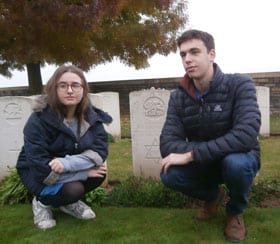School trip to the WWI battlefields
By utnvlru, on 20 November 2015
 Working in media/press at the UCL Institute of Education, I am dealing daily with issues and research around teaching and education. However, it is quite rare to get a chance to engage with schools, teachers, and pupils directly and witness the real-life aspect of the work that IOE is involved in.
Working in media/press at the UCL Institute of Education, I am dealing daily with issues and research around teaching and education. However, it is quite rare to get a chance to engage with schools, teachers, and pupils directly and witness the real-life aspect of the work that IOE is involved in.
I therefore found it a really interesting experience to be able to take part in one of the First World War Centenary Battlefields Tours Project (FWWCBTP) trips – a five year project running until 2019 by the IOE in conjunction with Equity Tours, and funded by the Department for Education (DfE) and the Department for Communities and Local Government (DCLG), which allows every state secondary school in England to send two pupils and one teacher to the Ypres and the Somme to visit the First World War Battlefields.
It was insightful and hugely enjoyable not only to learn more about The Great War myself, but also to meet and the teachers and learn more about their jobs, the pressures and the satisfactions; as well as meeting some really engaged and bright pupils and witnessing how they immersed themselves into this experience.
The tours, which take place over four days, offer the pupils, who range in age from 14 to 18, the opportunity to see the First World War Battlefields, cemeteries and memorials first-hand. The aim of the project, as opposed to other Battlefield tours, is for the pupils to engage on a more personal level with the war; they are encouraged to research soldiers from their local areas who took part, and, where possible, any relatives from their own family. They then have the opportunity to follow the journey of these soldiers and locate their place of burial while in Ypres and the Somme.
Before we set-off for Belgium, the first afternoon and night was spent at Grosvenor House activity centre in Ashford, Kent – where the pupils and teachers take part in briefing and learning activities, giving them a chance to bond and think about the experience they are about to have.
One of our first stops on a rriving in Belgium was Lissenthook cemetery, where the vast number of graves really brings home the scale of the numbers of young men who lost their lives during the war. Our guide tells us the story of one soldier whose grave we see, who was only 15 when he went to war and lost his life, having lied about his age as like many young men he was so eager to fight for his country.
rriving in Belgium was Lissenthook cemetery, where the vast number of graves really brings home the scale of the numbers of young men who lost their lives during the war. Our guide tells us the story of one soldier whose grave we see, who was only 15 when he went to war and lost his life, having lied about his age as like many young men he was so eager to fight for his country.
Later that evening we attended The Last Post ceremony which has taken place every single evening since 1927, at the Menin Gate memorial to the missing in Ypres. Buglers play the traditional final salute to the fallen, before wreaths are laid and a minutes’ silence is observed by the crowd. Two pupils from each of our three coaches are given the chance to take part in this, an experience they clearly feel very proud of.
The trip which I took part in included children from Jewish faith schools, bringing another element to the tour – many of us are not aware that Jewish soldiers were involved in the First World War, as were those of many other nationalities and faiths such as Muslim soldiers.
The next day our coach took us across the border into France; on our first stop at the Bailleul Road cemetery we got to visit the grave of a particular well-known Jewish soldier, the poet Isaac Rosenberg – who incidentally studied at UCL’s Slade School of Fine Art. The students were given copies of his and other WW1-inspired poems to help them reflect on the soldier’s experiences.
The FWWCBTP project aims to help maintain the legacy of World War One via the Legacy 110 initiative, for every student who participates over the five years to create an enduring legacy by impacting upon at least 110 people within their local community. If achieved, this would equal 888,246 – equivalent to the number of British and Commonwealth soldiers who fell during the First World War.
Following the trip, I attended an event to showcase Legacy 110 at the House of Lords – recognising the contribution the students have made towards this – with four schools being awarded a prize for their follow-up projects. I was particularly moved by ‘My Mate George’ a song that two pupils from Tottenham Hale Special School had written with their music teacher, telling the story of a soldier from their local community that they had traced.
Taking part in both the tour and the Legacy 110 event left me feeling heartened at how young people seemed so able to empathise and connect with the experiences and scale of loss of men and families from a century before the time they are now growing-up in.
 Close
Close

